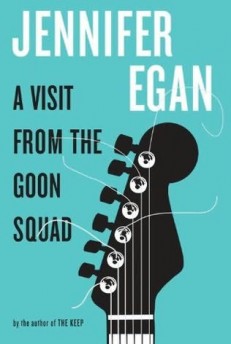 Reviewed:
Reviewed:
A Visit from the Goon Squad by Jennifer Egan
Knopf, 288 pp., $25.95
The plaintive, seemingly rhetorical query—“How did I go from being a rock star to being a fat fuck no one cares about?”—comes about a third of the way into Jennifer Egan’s new novel, underscoring the all-too-obvious trajectory of Bosco, formerly the dynamic guitarist for punk-ska hybrid band the Conduits who had once “made Iggy Pop look indolent on stage,” presently the “obese, alcoholic, and cancer-ridden” has-been. Bosco answers himself:
This is reality, right? You don’t look good anymore twenty years later, especially when you had half your guts removed. Time’s a goon, right? Isn’t that the expression?
It is not an expression, of course, but in the context of A Visit From the Goon Squad, it might as well be. Destructive, aggressive, liable to disillusion, the goon squad that is time overpowers and enforces, makes fat fucks of us all. Egan surveys the damage, focusing on a group of people loosely bound by youthful allegiance to punk rock and middle-age disenchantment, trotting through times (the 1970s, the 1990s, the early 2000s, and a near, alarmingly recognizable future dominated by communication devices called “handsets” and fears of inevitable selling out) and places (San Francisco, New York, city and suburb, Naples, Africa) in chapters that could easily stand alone as short stories. (Three of them, in fact—“Found Objects,” “Ask Me If I Care,” and “Safari”—have recently appeared in The New Yorker.)
As the book opens, Sasha, a redheaded assistant to a record executive, grapples with her troublesome habit of petty theft. In the next chapter, we get to know her boss, Sow’s Ear Records chief Bennie Salazar, no longer on the top of his game and prone to mournful, regretful reminiscing. Those he thinks about most—his one-time mentor, Lou; the friends of his punk-rock adolescence, Rhea and Jocelyn; his former Flaming Dildos bandmate, Scotty—all get chapters of their own. Wondering about Bennie’s ex-wife, Stephanie? Here she is, the central figure in a tale exploring the demise of a marriage, unraveled by the pressures of success and excess. Curious about what became of Stephanie’s publicist boss, Dolly, whose professional alias is the unlikely-sounding La Doll? So glad you asked: she is using her formidable PR skills to rehabilitate the reputation of a genocidal dictator, enlisting the help of Kitty Jackson, a once-famous starlet who was attacked by the reluctant celebrity journalist Jules Jones, brother of Stephanie, during an interview gone wrong. Want to know more about that interview? Not to worry.
Brought together as a novel, these stories paradoxically add up to something both more and less. Inhabiting all these perspectives, Egan—the author of three earlier novels and a collection of stories—is able to play with a variety of voices and styles. She deploys a number of postmodern tricks: There are footnoted asides in “Forty Minute Lunch: Kitty Jackson Opens up About Love, Fame, and Nixon,” which purports to reproduce Jules’ write-up of that ill-fated interview, and “Great Rock and Roll Pauses” consists, in its entirety, of a series of slides that Alison Blake, Sasha’s teenage daughter, uses to document her life. Still, for all the skill Egan wields, the accumulation of moments does not add up to a fully satisfying or enlightening whole.
These stories are meant to build upon one another, to tell us something about the characters and their evolution, about the inexorable progression of bodily and emotional decay, but their particulars too often seem merely contrived. Taken individually, most of the stories are lovely: small and intricate, ripe with just enough detail to allow us to imagine beyond their parameters. Taken together, they lose their initial intimacy, their disclosures coming to seem less revelatory than artificial and convenient.
The plight of all Egan’s characters is time, the way it shapes their destinies, often imperceptibly. These people love—love each other, punk rock, the future—and hope and idealize, until suddenly it has been 20 years, the future made past, possibly irredeemable.
Yevgeniya Traps is a doctoral candidate in English at the Graduate Center-CUNY.
Mentioned in this review:

